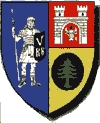Sălciua
Sălciua | |
|---|---|
 View of Sălciua | |
 Location in Alba County | |
 Sălciua Location in Romania | |
| Coordinates: 46°24′N 23°25′E / 46.400°N 23.417°ECoordinates: 46°24′N 23°25′E / 46.400°N 23.417°E | |
| Country | Romania |
| County | Alba |
| Population (2011)[1] | 1,428 |
| Time zone | EET/EEST (UTC+2/+3) |
| Vehicle reg. | AB |
Sălciua (Hungarian: Szolcsva; German: Sundorf) is a commune located in Alba County, Transylvania, Romania. It is composed of six villages: Dealu Caselor (Hegyik), Dumești, Sălciua de Jos (the commune center; Alsószolcsva), Sălciua de Sus (Felsőszolcsva), Sub Piatră (Búvópatak) and Valea Largă (Malompataka). It has a population of 1,785.
Geography[]
Sălciua village is situated in the north of Alba County, Arieș valley, 100 km from Alba Iulia and 15 km from Baia de Arieș, the nearest town, near the national road DN 75 joining Câmpeni to Turda.
Located near the basin of Arieș River, in between the Trascău Mountains and , it has a specific mountain landscape developed on limestone and crystalline schists. The altitude varies between 700 and 1400 m. The big Arieș meadow offers favorable conditions for agriculture, the large crop fields leading to the area being named the "Bărăgan of the Apuseni Mountains".
The great variety of karst topography, with its spectacular flora and fauna and climatic characteristics make it a big tourist attraction. The village also has historic wooden churches.
History[]
In 1925, a few Romanian families were relocated in Banat, where they founded Sălciua Nouă village (the New Sălciua), now part of Pișchia commune, in Timiș County.
Sights[]
- "Cuvioasa Parascheva" wooden church (1798), in Sub Piatră village.
- "Sfânta Treime" and "Sfântul Ilie" wooden churches (1782), in Valea Largă village.
- Huda lui Păpară cave.
- Poarta Zmeilor (Gate of Dragons) cave, in Sub Piatră village.
- "" natural reservation, in Dumești village.
- "" natural reservation.
- "Detunata" (the Roar) geological reservation.
Natives[]
References[]
- ^ "Populaţia stabilă pe judeţe, municipii, oraşe şi localităti componenete la RPL_2011" (in Romanian). National Institute of Statistics. Retrieved 4 February 2014.
| Wikimedia Commons has media related to Sălciua, Alba. |
- Communes in Alba County
- Localities in Transylvania

